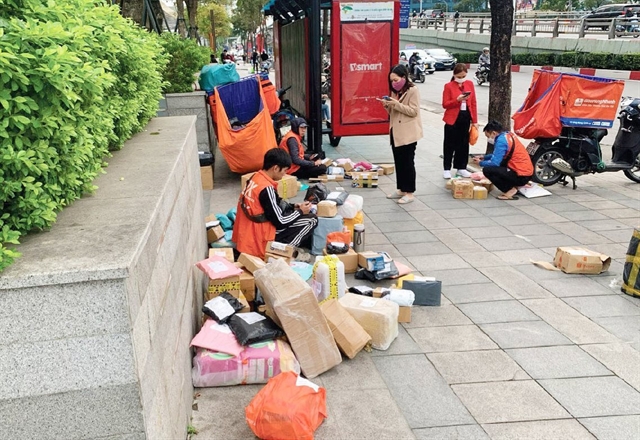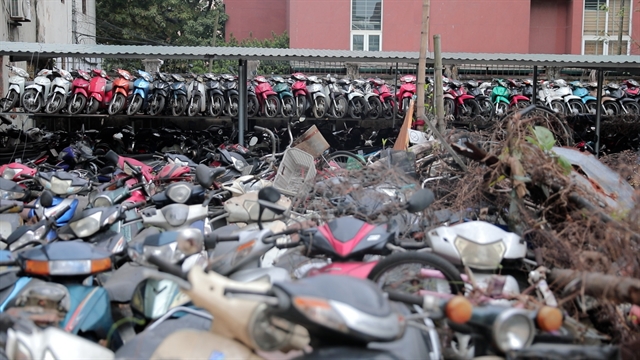 Society
Society

By Trinh Nguyễn
HÀ NỘI — This is where old motorbikes go to die. A graveyard of two-wheelers on the outskirts of Hà Nội. Packed to the rafters and bursting at the seams.
Here you’ll find Yamahas, Hondas and many more, unloved, unwanted, gathering dust, and in the cases of the longer-term still roadworthy residents, gathering rust.
.jpg) |
| Many impounded motorbikes will be liquidated, but this process takes a lot of time. — Photos Trinh Nguyen |
In this one lot, there are more than 4,000 motorbikes. All were confiscated from their owners guilty of traffic violations.
Getting them back is a simple process. They just need to pay a fine. But when penalties for violations outweigh the value of the motorbike, many people think: “What’s the point?”
Often bikes are scrapped, or sold for parts, but even that process has its problems as it is quite complicated and takes a lot of time, in some cases, up to three years.
Many bikes are reclaimed, particularly newer models, but other, older motorbikes stay put.
Conditions are so cramped at the Hà Cầu Thăng Long company in Hà Đông district of Hà Nội, that management, seeking a respite, asked that no more vehicles be sent their way.
Nguyễn Văn Miềng, Deputy Director of the Hà Cầu Thăng Long company, said: “The parking lot is planned to be 3700m2, but the large number of impounded vehicles exceeds the available space. Currently, we have to request units to stop sending more vehicles.
 |
| There are about 4,000 impounded motorbikes left in this parking lot. |
“Our company has signed contracts for impounded vehicle storage after traffic violations with the Traffic Police Department, district police, and several other units.
“However, our parking lot space is limited, while the number of impounded vehicles is substantial, leading to overloading. The backlog of vehicles presents numerous issues, including disposal policies and the failure of traffic offenders to claim their vehicles, resulting in a significant accumulation year after year, enduring weather conditions and causing a waste of citizens' and societal resources.”
It’s not just motorbikes clogging up the space. Cars too are impounded here but fines are paid quicker, and the vehicles returned to their owners much faster than motorbikes.
Miềng added: “This parking lot has been operational for over 20 years, but the disposal process sometimes takes two or three years to complete.
“Presently, about 4,000 motorcycles and approximately 30 cars remain here, impounded for several years now, impossible to dispose of. Last year, over 700 motorcycles were disposed of, but none have been disposed of this year.”
“When the police bring vehicles here for storage, they notify the owners according to state regulations,” he said.
“After the deadline, if the owners don't claim their vehicles, the police record the vehicle identification numbers and hand the case over to the Liquidation Council, which involves multiple departments.
“I'm not sure where the complications arise. The police operate under a six-month or one year deadline for notifying vehicle owners; if they don't claim their vehicles, the police initiate the liquidation process.
“In reality, the storage fees are minimal. Sometimes, when there are too many vehicles, we even offer discounts to encourage owners to reclaim their vehicles sooner, reducing the daily rate to just 5,000 VNĐ to facilitate the release of parking spaces.”
Legally speaking the laws are clear: commit the crime, pay the fine.
But one lawyer believes the process needs speeding up if authorities want to see an end to motorbike graveyards like this one.
Tô Thị Phương Dung from Minh Khuê Law Firm said: “According to Consolidated Document No. 03 of the Ministry of Transport on administrative penalties for road traffic violations, vehicles can be impounded for a maximum of seven days before an administrative penalty decision is issued.
“These violations include operating a motorbike on the highway, forming a group of two or more vehicles, exceeding the prescribed speed limit, failing to comply with the requirement to test the alcohol and drug levels of the person performing official duties, not carrying vehicle registration, etc.
“In such cases, vehicles may be subject to administrative fines, with penalties of up to VNĐ40 million. For alcohol-related offenses, fines range from VNĐ8 to 40 million.”
But she accepts that when fines cost so much more than the actual value of the motorbike, problems arise.
Explaining the backlog, she said: “The first reason is that the value of the vehicle is much lower than the fine amount. The second reason is the difficulty in proving ownership of the impounded vehicle, as many unofficial transfers occur through multiple intermediaries.
“Traffic violators who fail to pay fines on time may face enforcement actions, warnings regarding vehicle registration, refusal of future registration procedures, and additional late payment fees for not complying with the specified timeframe.
"To reduce the number of vehicles held in impound lots, it is necessary to raise awareness among citizens about the importance of obeying traffic laws to ensure the safety of all road users.
“Secondly, penalties should be strictly enforced but within a specified timeframe, with local notifications regarding the status of unclaimed vehicles, which cause losses, wasting budget and financial resources, and directly impacting the citizens.”
.jpg) |
| Motorbikes impounded for violating traffic laws are piled up at the Hà Cầu Thăng Long parking lot. |
Motorist Trần Hà abides by the rules, and luckily for him, his car is not in the pound. But he does work nearby and sees the growing number of vehicles rotting away.
“I see that the vehicles violating traffic laws brought here are being stored for too long, some even in a state of disrepair, without any resolution in sight,” he said.
“The lot owner struggles, with no parking space available for daily customers, resulting in waste and significant losses for the people. Many individuals end up abandoning their vehicles due to excessively high fines.
“In my opinion, the government should set a deadline for vehicle disposal to avoid situations where owners have clearly abandoned their vehicles. The government can notify the violators that if vehicles remain unclaimed past the deadline, they will be disposed of.”
For now, the motorbikes remain. Last year more than 40,000 were confiscated in Hà Nội, with the fines paid on the majority.
But others stay here. Trapped in Hà Nội’s motorcycle graveyard, with no escape in sight anytime soon. — VNS




